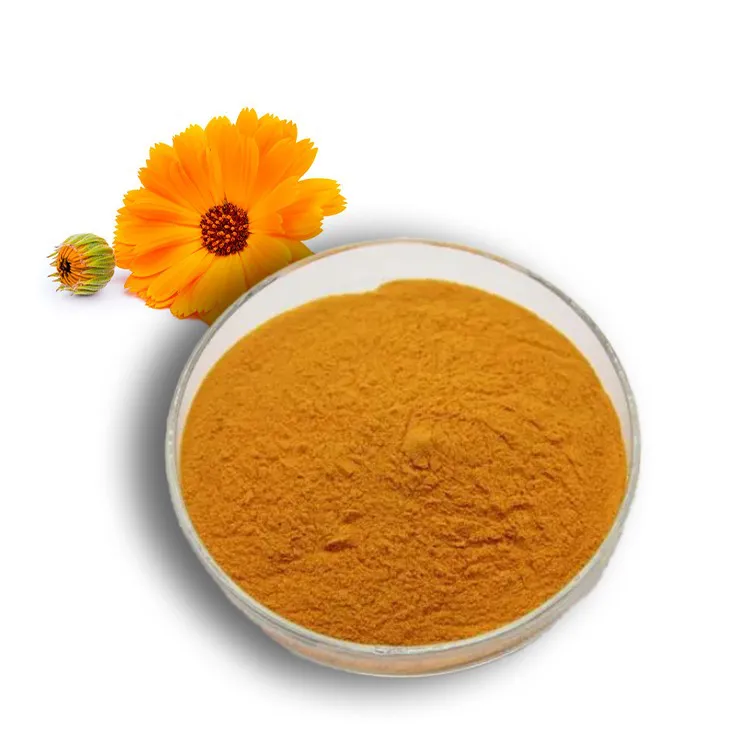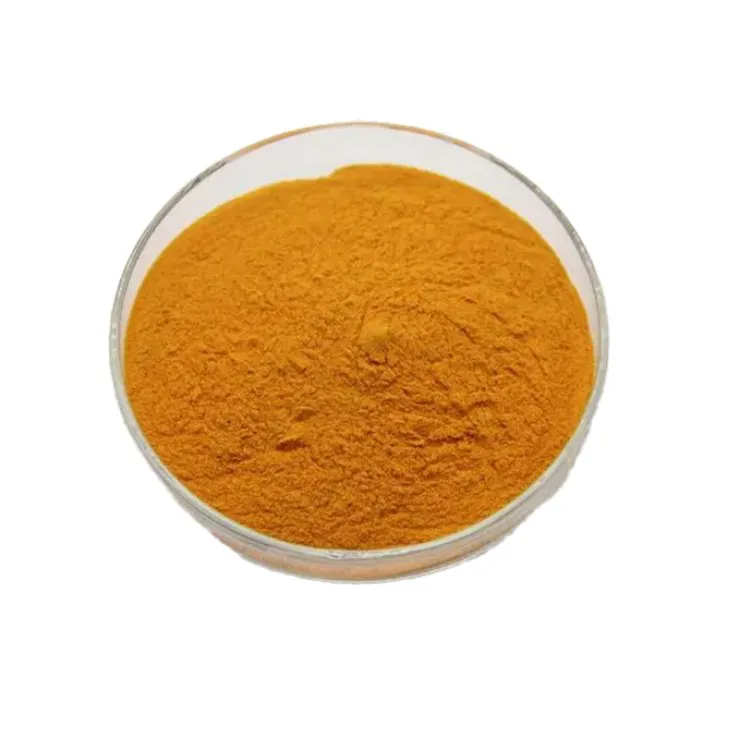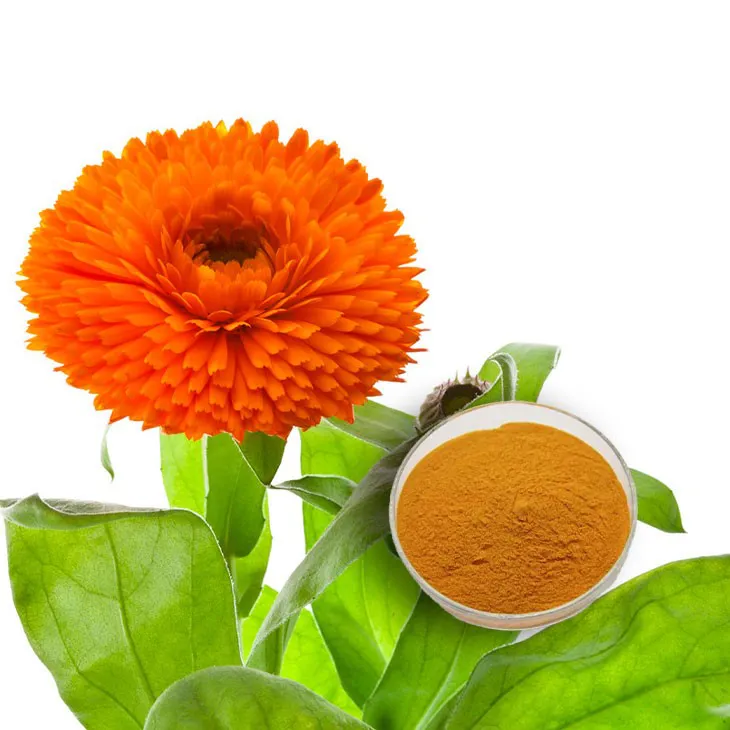- 0086-571-85302990
- sales@greenskybio.com
What is Calendula Extract? Definition, Types, History and Nutritional Value.
2024-12-19

1. Definition of Calendula Extract
Calendula Extract is a natural substance obtained from the Calendula officinalis flower. This flower, commonly known as marigold, has been used for centuries in various cultures. It is a concentrated form of the active components present in Calendula flowers. These components are extracted through methods like solvent extraction or steam distillation.

2. Types of Calendula Extract
There are different types of Calendula extract based on the extraction method and the intended use:
2.1 Tinctures
Tinctures are alcohol - based extracts. They are often used in herbal medicine. The alcohol helps to dissolve and preserve the active components of the Calendula. Tinctures can be taken orally, usually diluted in water or another liquid, or used topically for certain skin conditions.
2.2 Oil - based Extracts
Oil - based extracts are made by infusing Calendula flowers in oils such as olive oil or almond oil. These extracts are popular in skincare products. They are beneficial for moisturizing the skin and can help soothe irritated skin. The oil - based extract can also be used in haircare products to nourish the scalp and hair.
2.3 Water - based Extracts
Water - based extracts are often used in skincare products. They are made by steeping Calendula flowers in water and then filtering the liquid to obtain the extract. Water - based extracts are gentle on the skin and are suitable for sensitive skin types. They can be used in facial toners, creams, and lotions.

3. History of Calendula
Calendula has a long and rich history:
-
The Ancient Greeks used Calendula for its medicinal properties. They recognized its potential in treating various ailments and used it in their traditional medicine.
-
The Romans also made use of Calendula. They valued it for its healing abilities and likely used it in similar ways to the Greeks.
-
In medieval Europe, Calendula was widely used. It was used in poultices to treat wounds and skin ailments. The flowers were crushed and applied directly to the affected area to promote healing and reduce inflammation.
-
Indians also have a long history of using Calendula. In Ayurvedic medicine, it may have been used for its various therapeutic effects.
-
It was also used in cooking in some regions. The flowers were added to dishes for their color, flavor, and potentially their health - promoting properties.

4. Nutritional Value of Calendula Extract
Calendula extract contains several important components that contribute to its nutritional value:
4.1 Flavonoids
Flavonoids are antioxidants that play a crucial role in protecting the body from free radical damage. Free radicals are unstable molecules that can cause damage to cells and contribute to various diseases. Flavonoids in Calendula extract help to neutralize these free radicals, thereby reducing the risk of oxidative stress - related conditions such as heart disease, cancer, and aging - related skin problems.
4.2 Triterpenoids
Triterpenoids have anti - inflammatory properties which can be highly beneficial for skin health. Inflammation is a natural response of the body to injury or infection, but chronic inflammation can lead to skin problems such as acne, eczema, and psoriasis. The triterpenoids in Calendula extract can help to reduce inflammation in the skin, soothe irritation, and promote the healing of skin lesions.
4.3 Carotenoids
The carotenoids give the extract its characteristic color and also contribute to antioxidant activity. They are pigments that are also found in other colorful fruits and vegetables such as carrots and tomatoes. Carotenoids in Calendula extract help to protect the skin from UV damage and can also improve the overall appearance of the skin by giving it a healthy glow.

5. Applications of Calendula Extract
Calendula extract has a wide range of applications:
5.1 Skincare
-
Calendula extract is used in moisturizers to hydrate the skin. It helps to lock in moisture and keep the skin soft and supple.
-
It is also used in anti - acne products. Its anti - inflammatory properties can help to reduce the redness and swelling associated with acne.
-
In creams for eczema and psoriasis, Calendula extract can soothe the itchy and inflamed skin, providing relief to sufferers.
-
It can be used in eye creams to reduce puffiness and dark circles. The gentle nature of Calendula extract makes it suitable for the delicate skin around the eyes.
5.2 Haircare
-
Calendula - based hair products can be used to treat a dry and itchy scalp. The anti - inflammatory properties can help to relieve scalp irritation.
-
It can also add shine to the hair. The nutrients in the extract can nourish the hair follicles, resulting in healthier - looking hair.
5.3 Oral Health
-
Some natural oral care products contain Calendula extract. It can help to soothe gum inflammation and promote gum health.
-
It may also have antibacterial properties that can help to fight against oral bacteria, reducing the risk of cavities and bad breath.
6. How to Use Calendula Extract
Here are some common ways to use Calendula extract:
6.1 Topical Application
-
If using a Calendula tincture, dilute it in a suitable carrier oil or water before applying it to the skin. This helps to reduce the potential for skin irritation from the alcohol.
-
Calendula - based creams and lotions can be applied directly to the skin. Gently massage the product into the skin until it is fully absorbed.
-
For haircare, apply Calendula - infused oil to the scalp and hair, leaving it on for a period of time before washing it out.
6.2 Oral Consumption
-
If taking Calendula tincture orally, follow the recommended dosage instructions. Usually, a few drops diluted in water or juice can be taken a few times a day.
-
Some herbal teas may also contain Calendula extract. Drink the tea as per the instructions on the product label.
7. Precautions and Considerations
While Calendula extract is generally considered safe for most people, there are some precautions and considerations:
7.1 Allergic Reactions
Some individuals may be allergic to Calendula. Before using any Calendula - based product, it is advisable to do a patch test on a small area of skin. If any redness, itching, or swelling occurs within 24 hours, do not use the product.
7.2 Pregnancy and Breastfeeding
Although there is limited evidence of harm, pregnant and breastfeeding women should consult their healthcare provider before using Calendula extract, especially if using it orally or in large amounts topically.
7.3 Interaction with Medications
If you are taking medications, especially blood - thinning medications, there may be a potential interaction with Calendula extract. It is important to consult your doctor or pharmacist before using Calendula - based products.
FAQ:
What are the main extraction methods of Calendula Extract?
The main extraction methods of Calendula Extract are solvent extraction and steam distillation. Solvent extraction uses a suitable solvent to dissolve out the active components from the Calendula flowers. Steam distillation involves using steam to separate the volatile components from the plant material.
How is Calendula Extract used in skincare?
Calendula Extract is used in skincare in various ways. Water - based extracts are often used in products like creams, lotions, and toners. It has anti - inflammatory properties which can soothe irritated skin. It also contains antioxidants that can help protect the skin from environmental damage and may contribute to anti - aging effects.
Can Calendula Extract be used internally?
Yes, in some forms Calendula Extract can be used internally. Tinctures, which are alcohol - based extracts, are sometimes used in traditional medicine. However, it should be used with caution and under the guidance of a healthcare professional, as improper use may have potential side effects.
What makes Calendula Extract beneficial for wound healing?
The anti - inflammatory and antioxidant properties of Calendula Extract contribute to its beneficial effects on wound healing. The triterpenoids with anti - inflammatory properties can reduce inflammation around the wound, and the flavonoids as antioxidants can protect the newly forming tissue from free radical damage, thus promoting the healing process.
Are there any side effects of using Calendula Extract?
When used topically in normal concentrations, Calendula Extract is generally well - tolerated. However, some people may be allergic to it and may experience skin irritation. When used internally, it may interact with certain medications or cause digestive issues in some cases. So, it is important to consult a healthcare provider before using it internally.
Related literature
- Calendula officinalis: From Traditional Use to Scientific Evidence"
- "The Therapeutic Potential of Calendula Extract: A Review of its Phytochemistry and Pharmacological Properties"
- ▶ Hesperidin
- ▶ citrus bioflavonoids
- ▶ plant extract
- ▶ lycopene
- ▶ Diosmin
- ▶ Grape seed extract
- ▶ Sea buckthorn Juice Powder
- ▶ Beetroot powder
- ▶ Hops Extract
- ▶ Artichoke Extract
- ▶ Reishi mushroom extract
- ▶ Astaxanthin
- ▶ Green Tea Extract
- ▶ Curcumin Extract
- ▶ Horse Chestnut Extract
- ▶ Other Problems
- ▶ Boswellia Serrata Extract
- ▶ Resveratrol Extract
- ▶ Marigold Extract
- ▶ Grape Leaf Extract
- ▶ blog3
- ▶ blog4
- ▶ blog5
-
Pure 85% Tomentil Extract.
2024-12-19
-
Golden Seal Extract
2024-12-19
-
Almond Extract Powder
2024-12-19
-
Plantain extract
2024-12-19
-
Konjac Powder
2024-12-19
-
Uridine-5'-monophosphate Disodium salt
2024-12-19
-
Hedyotis Diffusa Extract
2024-12-19
-
Sophora Japonica Flower Extract
2024-12-19
-
Lemon Juice Powder
2024-12-19
-
Yam Extract
2024-12-19
-
Genistein
2024-12-19





















